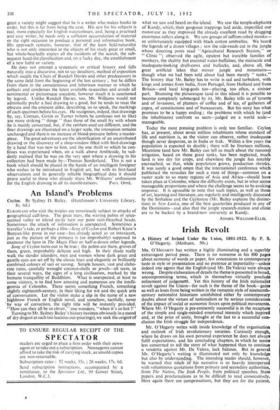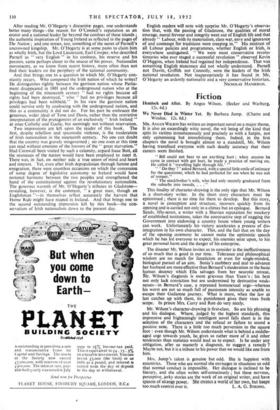Irish Revolt
A History of Ireland Under the Union, 1801-1922. By P. S. 0 'Hegarty. (Methuen. 50s.) MR. O'HEGARTY has written a highly illuminating and a superbly extravagant period piece. There is no nonsense in his 800 pages about economy of words or paper, few concessions to contemporary taste in style or presentation and no pretence at impartiality—unless indeed one agrees that the English (and Mr. De Valera) were always wrong. Despite elaboration of details the theme is presented in broad, uncompromising terms, which in themselves virtually preclude refinement of judgement. Yet this history of the Irish nationalist revolt against the Union—for such is the theme of the book—gains as well as loses from being written in the romantic style of nineteenth- century nationalist historians uninhibited either by contemporary doubts about the virtues of nationalism or by serious consideration of the impact of social or economic forces upon political movements. Where Mr. O'Hegarty is pre-eminently successful is in the recapture of the simple and single-minded emotional intensity which inspired and, at the price of unity, brought at the last to a successful con- elusion the Irish struggle for independence, Mr. O'Hegarty writes with inside knowledge of the organisation and outlook of Irish revolutionary societies. Curiously enough, where he draws on his own personal experience he does not always fulfil expectations, and his concluding chapters, in which he seems less concerned to tell the story of what happened than to continue a vendetta against Mr. De Valera, lack balance. But in general Mr. O'Hegarty's writing is illuminated not only by knowledge but also by understanding. The intending reader should, however, be warned that mla of his narrative is so heavily interspersed with voluminous quotations from primary and secondary authorities, from The Nation, The Irish People, from political speeches, State papers and proclamations as to be difficult to read consecutively. Here again there are compensations, but they are for the patient.
After reading Mr. O'Hegarty 's discursive pages, one understands better many things—the reason for O'Connell's reputation as an orator and a national leader far beyond the confines of these islands ; the authentic inspiration of Young Ireland as reflected in the pages of The Nation ; and one senses, too, something of the secret of Pamell's uncrowned kingship. Mr. O'Hegarty is at some pains to claim him as wholly Irish, but the Lord Lieutenant, Earl Cowper, who described Parnell as "very English" in his coolness, his reserve and his passion, came perhaps closer to the source of his power. Nationalist movements, as we know from recent history, more often than not find their leaders on the periphery of the national community.
And that brings one to a question to which Mr. O'Hegarty con- stantly recurs. Who composed the Irish nation of which he writes? He distinguishes rightly between the garrison nation whose Parlia- ment disappeared in 1801 and the underground nation who at the beginning of the nineteenth century " had no rights because all rights had been destroyed," who "had no privileges because all privileges had been withheld." In his view the garrison nation could survive only by coalescing with the underground nation, and this as a community it did not do. For his part he embraces the 'generous, wider ideal of Tone and Davis, rather than the restrictive interpretation of the protagonists of an exclusively " Irish Ireland " at once Catholic and Gaelic, but seemingly not without reservation.
Two impressions are left upon the reader of this book. The first, despite rebellion and spasmodic violence, is the moderation of Irish nationalism in the nineteenth century. No one can doubt that the country was gravely misgoverned.; no one even at this time can read without emotion of the horrors of the" great starvation." Had Cornwall been visited by such a calamity, argued Isaac Butt, all the resources of the nation would haye been employed to meet it. There was, in fact, on. neither side a' true union of mind and heart and interest. Yet, even after Irish depopulation through famine and emigration, there were countless occasions on which the concession of some degree of legislative autonomy to Ireland would have restored harmony between the two peoples and strengthened the hand of the constitutional against the revolutionary nationalists. The generous warmth of Mr. O'Hegarty's tributes to Gladstone— revealing, however, is the comment, "a great man, though an Englishman "—in themselves reflect accurately the harvest that Home Rille might have reaped in Ireland. And that brings one to the second outstanding impression left by this book—the con- servatism of Irish nationalism down to the present day.
English readers will note with surprise Mr. O'Hegarty's observa- tion that, with the passing of Gladstone, the qualities of moral courage, moral fervour and integrity went out of English life and that already" Labour, with its materialism, class war, envy and ignorance of and contempt for traditions were creeping in." His mistrust of all Labour policies and programmes, whether English or Irish, is everywhere undisguised. "We were most conservative revolu- tionaries who ever staged a successful revolution" observed Kevin O'Higgins, when Ireland had regained her independence. That was something English -statesmen did not wholly understand. Parnell not Davitt, Griffith not Connolly, were the leaders of the Irish national revolution. Not inappropriately it has found in Mr. O'Hegarty an ardently nationalist and a very conservative historian.
NICHOLAS- MANSERGH.



































 Previous page
Previous page